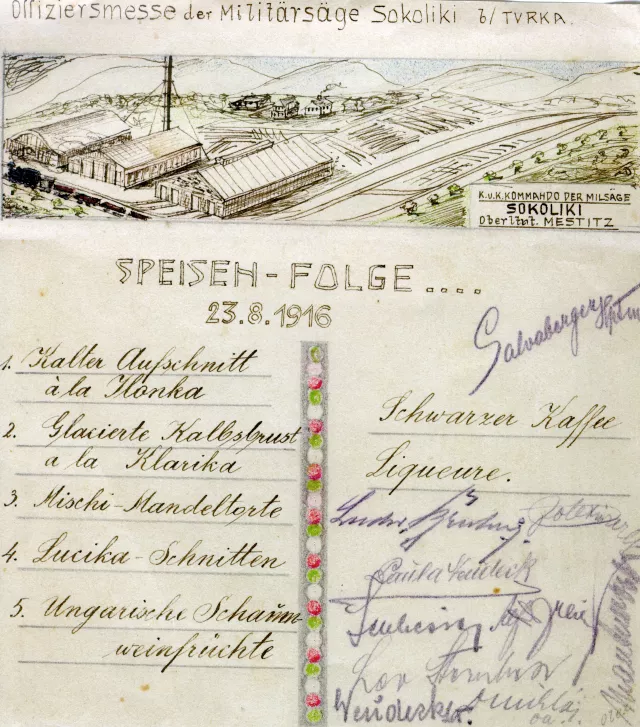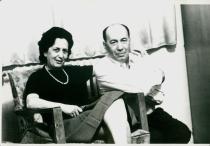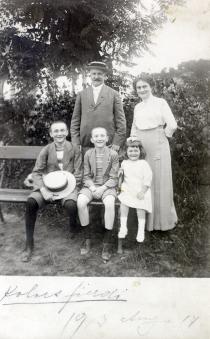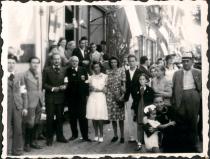This is the menu for the farewell dinner in Sokoliki, where my family was during World War I. The paper had a frame and a back, only it came undone. They cooked something, and each meal was named after one of us, the Mestitz family members.
The first course: Kalter Aufschnitt á la Ilonka, that is, cold cuts á la Ilonka.
The second course: Glacierte Kalbsbrust á la Klarika, a breast of veal dish, some frozen thing, how they made it, I don't know.
The third course: Mischi - Mandeltorte, this is almond cake named after Misi.
The fourth course: Lucika - Schnitten, Lucika meat slices. It seems they called me Luci instead of Juci
The fifth course: Ungarische Schaum-Weinfrüchte, this was some Hungarian wine and fruit.
This feast took place on 23rd August, on my parents' - Ilona and Henrik Mestitz - wedding day. It looks like they organized the feast to honor this day. And there are the signatures of those who participated.
After the war broke out, my father went to Galicia as a captain. He was sent there, to the outskirts of Lemberg [today Ukraine], because the enemy had destroyed fourteen sawmills, and they knew he owned one here, and he had the proper competence.
After I recovered from pneumonia, the doctor recommended a change of air. I don't know whose idea it was to go there - looking at it today, it seems absurd. Probably my dad was longing for us. He sent a sergeant for us, and he took my grandfather Laszlo, my mom, me, my older sister Klara and my brother Mihal to my dad's place in Galicia for a change of air. I think it was total nonsense to make such a venture during the war. We went there by train, and we had to change trains many times. I remember that they tied us together by our hands in order to keep us together. Despite all this Misi still managed to free himself and he wandered so far away that when they managed to find him, it was just one minute before the train's departure.
We planned to stay only for a few months, but we remained there until 1916. Dad was stationed 80 kilometers from Lemberg, and he had a lot of people under his command. There were many officers, and they were building, as well as repairing the sawmills. Although I don't remember, I'm quite sure there were other Jewish soldiers there, as well.
The menu in Sokoliki
Share
Photos from this interviewee
The Centropa Collection at USHMM
The Centropa archive has been acquired by the United States Holocaust Memorial Museum in Washington, DC.
USHMM will soon offer a Special Collections page for Centropa.
Academics please note: USHMM can provide you with original language word-for-word transcripts and high resolution photographs. All publications should be credited: "From the Centropa Collection at the United States Memorial Museum in Washington, DC". Please contact collection [at] centropa.org.












































